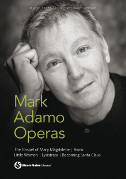- Mark Adamo
Little Women (1998)
- G Schirmer Inc (World)
Commissioned by Houston Grand Opera
- 1(pic,afl).1(ca).1(bcl).1(cbn)/1.0.0.0/perc/hp.pf(cel,syn)/str(min 3.2.2.2.1)
- Baritone, 2 Basses, 3 Mezzo Sopranos, 3 Sopranos, Tenor
- 2 hr
- Libretto by the composer after the novel by Louisa May Alcott.
- English
- 28th December 2025, Sir James Dunn Theatre, Halifax, NS, Canada
- 29th December 2025, Sir James Dunn Theatre, Halifax, NS, Canada
Programme Note
Composer Note
More than a century after its publication, Louisa May Alcott's chronicle of growing up female in civil-war era New England remains a main dish in the smorgasbord of American popular fiction. Readers have devoured the adventures of Meg, Jo, Beth, and Amy in more than one hundred languages. In our own land and tongue, Hollywood has had to film the piece once every 20 years or so to slake the recurring appetite. The applause that hailed Little Women in its own century echoes in its steadily rising prestige at the close of our own; writers as diverse as Simone de Beauvoir and Joyce Carol Oates have claimed Alcott as a literary ancestor.
I read the book as a child, and loved it. And I recognized that Little Women itself solves certain problems for the opera composer. The novel itself — part classic, part mass-culture perennial — as well as its young, lively characters in their antique locale reminded me of opera itself these days: an art buzzing with new writing and thinking while still working with resources (the bel-canto trained voice, the acoustic orchestra) that stabilized one hundred years ago. I knew Jo's wild imagination, her haunting memories, would free me musically to range between abstract and tonal, poetic and vernacular, song and symphonic forms.
The conflict of Little Women is Jo versus the passage of time. Realize this about Jo: alone among adolescent protagonists in classic American fiction (Tom Sawyer, Holden Caulfield, Portnoy), she's happy where she is. Adored by her family, she adores them in turn. Not so poor as to starve, Jo is just poor enough to see in each small windfall gold to delight a Midas. Jo knows adulthood will only graduate her from her perfect home. She fights her own and her sisters' growth because she knows deep down that growing up means growing apart.
— Mark Adamo
Cast List
JO: Mezzo-soprano
LAURIE: Tenor
AMY: Soprano
BETH: Soprano
MEG: Mezzo-soprano
ALMA MARCH: Soprano
JOHN BROOKE: Baritone
Additional Character Singers
Percussion battery
Percussion I = Vibraphone, Chimes, Glockenspiel, Timpani, Bell Tree, Xylophone, Brake Drum, Crotale, Tam Tam, Temple Blocks
Percussion II = Tambourine, Triangle, Woodblock, Bass Drum, Ratchet, Snare Drum, Cow Bell, Brake Drum, Gong, Suspended Cymbal, Vibraphone (doubling on the Perc I instrument), Tam Tam, Tenor Drum
Synopsis
(Setting: Massachusetts during the Civil War)
Prologue
The dark attic of the March house.
Jo, distraught, greets her friend Laurie. He's just married Jo's younger sister Amy; but has he only married Amy to stay near Jo? Worse: Laurie adores Amy — nothing is as it was — and the opera spirals back in time to show why Jo tried to keep it so.
Act I, Scene 1
The attic, two years ago.
Jo and her sisters Meg, Beth, and Amy make games of their chores. Laurie tauntingly tells Jo that his tutor, John Brooke, keeps Meg's glove because he loves her. Jo, alone, sketching a story, fearfully denies that Meg might love him too.
Act I, Scene 2
In front of the March house, weeks later.
Brooke courts Meg. Jo urges the family to reject him. Cecilia, the girls' aunt also scorns Brooke: but Meg, resolved, accepts him. Her family celebrates; but Jo accuses Meg of abandoning her.
Act I, Scene 3
The March garden, the following summer.
Meg and Brooke adapt their parents wedding vows. A feverish Laurie pleads for Jo's love. She spurns him; stung, he flees. Beth, secretly ill, collapses as Meg cries for help.
Act II, Scene 1
The offices of the Daily Volcano, a New York City fiction tabloid, one year later.
A triumphant Jo sells a story; back at her boarding house, she writes her increasingly atomized family. A new acquaintance, Fredrich Bhaer, invites her to the opera.
Act II, Scene 2
Simultaneously, Jo's boarding house; the March parlour; sunny Oxford lawn.
Jo and Bhaer engage in flirtatious debate while, in Oxford, Amy tests Laurie's feelings for Jo. Beth rages at the piano. Bhaer ardently recites Goethe to Jo: then Alma's desperate telegram interrupts them. Jo flees to Concord.
Act II, Scene 3
Beth's bedroom, three sleepless nights later.
Beth dozes as her family keeps vigil. Jo bursts in; Beth bids her family leave. Beth urges Jo to accept her impending death.
Act II, Scene 4
Before the March house, the following spring.
Cecilia baits Jo with Amy's letter about loving Laurie. Jo wearily admits Bhaer may have abandoned her. Cecilia urges Jo to choose solitude; refusing, Jo retreats to the attic.
Act II, Scene 5
The attic.
As in the beginning, Jo, distraught. Laurie, appearing, again reminisces; but now Jo rejects the past. Her sisters materialize as memories: Jo, in emotional exorcism, celebrates and releases them. Bhaer — her future — appears: Jo extends her hand to him.
Media
Scores
Features

- Operas in Concert: Feminist Essays
- Discover operatic works that shine in concert performances from Wise Music Classical.

 Located in the UK
Located in the UK
 Located in the USA
Located in the USA
 Located in Europe
Located in Europe
